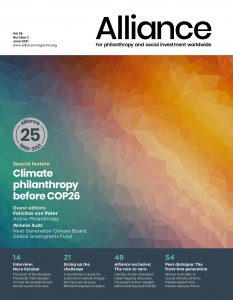Last year, Ellen Dorsey, of the Wallace Global Fund, called on philanthropy to declare a climate crisis. Stating the urgency to act on our current climate emergency, she challenged funders to accelerate their efforts and do more to mitigate climate change.
Have we?
Not really. And that’s the problem.
To be fair, there have been some promising developments over the past year in how philanthropy is working to tackle the climate crisis. Big bets are increasing – Jeff Bezos’ $10 billion Earth Fund is one example and IKEA Foundation’s €1 billion commitment is another. Funders are also increasingly coming together to pool resources in this crisis situation. ClimateWorks’ Funders Table has been doing so for some time, as has the European Climate Foundation, a regrantor that places philanthropic funding in critical areas such as low carbon power generation. And the new Philanthropy Coalition for Climate has been formed to nudge more traditional European funders to tackle climate change and ultimately join WINGS’ global philanthropy commitment on climate (to be announced at COP26 later this year).
But it’s not enough.
That’s because philanthropic capital will never be enough to tackle the climate crisis alone. The level of annual climate funding coming from foundations, which was approximately €1.6 billion in 2019, is eclipsed by the current investment from business and government. The UN’s 2019 Emissions Gap Report found that it will cost between $1.6 trillion and $3.8 trillion per year to mitigate the climate crisis, so it’s clear that philanthropy on its own will not fill that gap.
But if designed well, and in line with what philanthropy is meant to do, it can play an important and catalytic role.
So, what is philanthropy meant to do?
Well, philanthropy has come a long way since it first emerged. In an etymological sense, the Greek philanthrōpos translates into ‘loving’ (phil) ‘mankind’ (anthrōpos). Indeed, this deep commitment to humanity and its wellbeing is a powerful driver of philanthropic giving.
But because, relatively speaking, philanthropic funding is such a small percentage of the total investment needed for better education, increased conservation, improved working conditions, participatory democracies and pretty much everything else, philanthropy can only act as a catalyst. To test new approaches. To take risks. To nudge others into action.
Unlike governments, philanthropy is not tied to election cycles, so it can look beyond the short-termism that often afflicts elected administrations.
Unlike business, philanthropy can span multiple industries and geographies, adopting a cross-cutting role in the larger economic system.
Unlike finance, philanthropy doesn’t require a monetary return and can often de-risk opportunities for those who do.
Which is why, when it comes to philanthropy’s role in tackling climate, we, as funders, need to go where others will not or cannot go. We need to help show what’s possible, in order to inspire others to step in. And we need to help create the parameters, rules, policies and norms to create a level playing field that celebrates the leaders and pushes up the laggards.
That’s what we are aspiring to do at Laudes Foundation. We look for ways in which we can both inspire and challenge business to harness its power for good, focusing on those industries that have an outsized negative impact on both climate and social inclusion.
Sometimes this means we try to help business think bigger, reimagining the system in which we operate. For example, our partnership with the newly launched Bauhaus der Erde aims to redesign how we build our cities, bringing in wood and other bio-based materials to reduce the embodied carbon footprint of buildings.
Sometimes this means we invest in active research to create the evidence for change, as we have been doing with the New Economics Foundation, whose thoughtful analyses have been able to influence the policy dialogue around social protection and just transition.
When it comes to philanthropy’s role in tackling climate, we, as funders, need to go where others will not or cannot go.
Sometimes this means we focus on creating more transparency and accountability mechanisms. For example, through partners such as Frank Bold, Shift, the International Trade Union Confederation (ITUC) and European Coalition for Corporate Justice (ECCJ), we are supporting the movement to enact mandatory human rights due diligence legislation, ensuring that all voices – particularly workers and communities – are heard in these important policy discussions.
In all of these examples, there is a red thread to how we, as a philanthropic funder, work. We don’t go at it alone. Inspired by the work of others who came before us, we aim to use our precious resources to help bring others together, to create the urgency for change, to enable the collaborative action needed to address this climate crisis. We are joining existing donor collaboratives and exploring others that need to be established.
Because now is not the time to work in isolation. A climate crisis demands immediate, coordinated, enhanced action to catalyse change within our businesses, within our governments, and within our communities. Will philanthropy step up to meet this challenge? We hope so, and at Laudes Foundation, we’re holding ourselves accountable every day to help to ensure that it does.
Leslie Johnston is CEO of the Laudes Foundation.
 Upcoming issue: Climate philanthropy before Glasgow
Upcoming issue: Climate philanthropy before Glasgow
A follow up to our June 2016 issue ‘Climate philanthropy after Paris’, this issue looks at philanthropy’s role in addressing climate change as we approach the world’s pivotal climate summit five years on: COP26 in Glasgow. Guest edited by Global Greengrants Fund’s Winnie Asiti and Active Philanthropy founder, Felicitas von Peter.
Subscribe today to make sure not to miss it!



Comments (0)